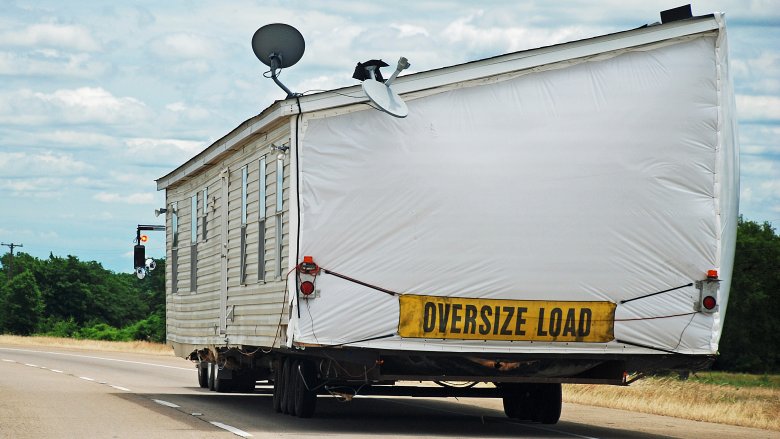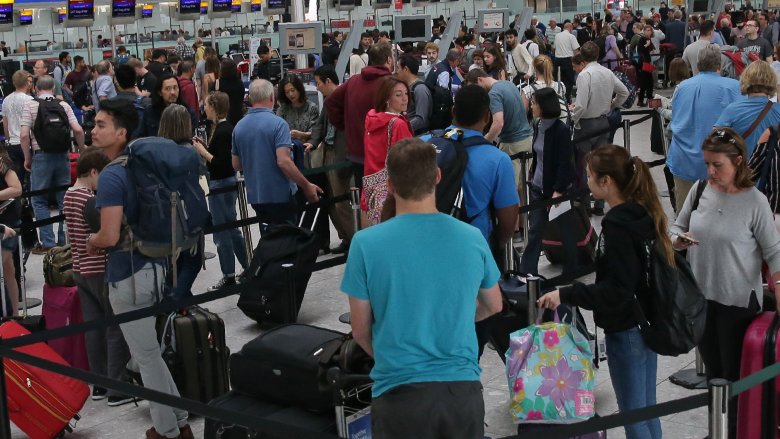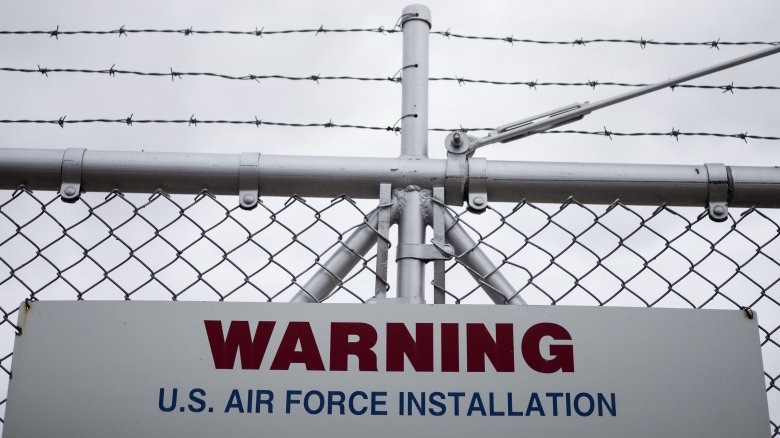Tiny Mistakes That Ruined Everything
Humans are great at making mistakes. Some of those slip-ups are minor, like mispronouncing a difficult name. Others give you tons of grief, like calling your spouse the wrong name during an 'I love you.' Unfortunately, you can never truly tell which mistakes will prove harmless and which will cause catastrophes. Even the teensiest errors can have gargantuan consequences, like the time a programmer disabled every website in Sweden by omitting a period from a line of code. Or like every disastrously small blunder listed below.
The Amazon bungle
Amazon's primarily known for its delivery and video streaming services, but it's also a web hosting juggernaut. According to figures cited by CNN, the company controls 40 percent of the cloud services market, giving it the ability to rain chaos on countless online entities should it choose to do so. This became apparent in March, 2017, when an Amazon employee accidentally crippled the internet with a typo.
The mishap arose from a botched attempt to debug Amazon's S3 storage service. As reported by NPR, the S3 billing system was operating too slowly. Since approximately zero companies like delayed payments, Amazon sent one of its workers to fix the problem. Done properly, the undertaking would have involved entering a command that removed a few billing-related servers. The employee, however, issued the wrong command, knocking out way more servers than intended.
With a typographical booboo, a process meant to speed something up caused an internet traffic jam. News sites couldn't publish content. Services like Slack, Sprinklr, and Trello lost partial or full functionality. Dozens of major retailers saw huge delays on their websites. Quoting The Wall Street Journal, NPR noted that companies in the S&P 500 index lost an estimated $150 million. Meanwhile, internet junkies likely foamed at the mouth as web withdrawal set in.
It took four hours to undo the damage. Amazon then apologetically explained how its debugging program infested the internet and announced upcoming safeguards to prevent future outages. Presumably, it will make the internet typo-proof or hire more attentive people.
Economy of fail
Budget calculations are so boring that you probably nodded off while reading this sentence. That's probably why government workers in Maryland made a basic budgeting error that cost the state millions of dollars.
In November, 2007, the Department of Assessments and Taxation for Montgomery County, Maryland had the name-appropriate duty of assessing taxation. Specifically, it had to determine the value of taxable real estate. As explained by The Washington Post, that figure helped decide how Maryland's tax revenue got divvied up among school districts. It was a highly important task, which is why the agency picked two newbies to do it.
To estimate the worth of Montgomery's real estate for 2007, the employees needed to report the value recorded in July of that year. Instead, they provided the predicted value for July of the next year, which was roughly $16 billion higher than the correct number. Luckily, the goof-up occurred at a government office devoted to number-crunching, where any number of employees or higher-ups might have recognized the error. Unluckily, nobody bothered to check.
Relying on mucked up math, Maryland allocated either too much or too little funding to at least 18 different school districts. The state's largest district suffered the most, getting shortchanged by $24 million that would have to be scrounged up somehow. Other schools received an extra $31 million which they got to keep. Because who calls backsies on $31 million? Overall, it was an expensive reminder to always check your work.
The bigger engines that couldn't
Ah, France, the land of baguettes, Napoleon, and trains. Granted, the country hasn't always been known for its locomotives. However, that changed after France's national rail service screwed up the most fundamental aspect of train travel, i.e., the trains' ability to travel.
It occurred in 2014 during a massive overhaul of France's train system. State-owned rail company SNCF ordered some 2,000 high-speed trains that were largely too broad for their platforms. It sounds like a joke, which (unlike those trains) is fitting since the story first appeared in a satirical newspaper. But as The Telegraph later confirmed, the tale was true and truly an embarrassment. How did the whole debacle happen? Through a simple reporting oversight.
See, in order to be useful, a train should fit not only its tracks, but all the stations it will pass through. That sounds incredibly obvious, but it obviously wasn't where the SNCF was concerned. According to Reuters, the company ignored rail stations more than 30 years old when placing its train order. Yet France had 1,300 stations over 50 years old. And those structures had platforms roughly 20 centimeters (7.9 inches) too narrow for the newer locomotives.
Costly changes were in order. Asking the trains to slim down wasn't an option, so the French government had to spend upwards of $110 million on widening train platforms. France became a laughing stock, which is no small feat for a country associated with mimes and body odor.
A home by any other name
In 1984, the city of Pomona, California welcomed its first modular-home park. Not to be confused with mobile homes, modular homes were built to stay in one place, meaning that thieves couldn't just drive off with them. That sounds like a strong selling point, especially when you consider that Pomona's modular homes cost as low as $50,000. Would-be homeowners flocked to the structures like moths to a bug zapper... and got burned just as badly.
As it turned out, the distinction between modular and mobile homes carried a lot of legal import. According to The Los Angeles Times, government officials specifically okayed homes built on fixed foundations. Pomona's modular homes certainly fit that description, but project developer John Hook erroneously registered the buildings as mobile homes. In turn, the city refused to grant ownership titles to the buyers, meaning none of them legally owned their properties.
Hook blamed the mix-up on semantic waffling by city officials: "First they were called trailers, then they were mobile homes, now the new name for them is manufactured homes. They're still boxes anyway you look at it." To the people who bought them, those "boxes" probably felt more like caskets for dead dreams.
One family went into bankruptcy because they couldn't legally refinance their modular home. Another bought an entire second home, assuming that they had legally sold their modular property. They were wrong. Multiple households just abandoned their houses, discarding their properties like garbage — the difference being, of course, that people can actually sell garbage.
Dollars and sense
Laws should always say what they mean and mean what they say. But what if a law says something with two possible meanings? Apparently, you get a multimillion dollar lawsuit fueled by tedious grammatical arguments. At least that was the case in Portland, Maine.
As summarized by Bangor Daily News, the courtroom kerfuffle dealt with a state law that excluded certain workers from receiving overtime pay. Specifically, the law named people involved in: "The canning, processing, preserving, freezing, drying, marketing, storing, packing for shipment or distribution of" produce, meat and fish products, or perishable foods.
Oakhurst Dairy interpreted that law to mean that its truckers — who distributed but didn't pack perishable goods — weren't entitled to overtime pay. But in 2014 some of Oakhurst's truckers contended that the phrase "packing for shipment or distribution" referred exclusively to packing-related activities. Otherwise, lawmakers would have inserted an Oxford comma between the words "shipment" and "or." They further argued that if "distribution" was supposed to be a separate activity from packing, it would have been written as a gerund (a noun ending in '-ing') like all the other activities on the list.
In short, since the law didn't say, "packing for shipment, or distributing," the truckers felt they were owed $10 million of unpaid overtime and presumably an A+ in English. Initially the courts sided with Oakhurst. But in 2017, an appellate judge ruled in favor of the truckers, citing grammatical ambiguities of Maine's overtime law. Sometimes being persnickety pays off.
Liberty and/or justice for all
Findings by the Centers for Disease Control indicate that in 2012 Missouri outpaced the rest of the U.S. in terms of drunk-driving deaths. That same year, lawmakers arguably upped the awfulness by altering the state's DWI law. It wasn't something overt, like requiring motorists to wear beer hats, but rather a single-word change to Missouri's breathalyzer requirements.
See, in order for breathalyzer readings to be court-admissible, Missouri requires the devices to be calibrated to a Blood Alcohol Content (BAC) of .04, .08, or .10. And for the majority of its time on the books, that's precisely what the law stated. However, as the St. Louis Post-Dispatch noted, for a 15-month interval between 2012 and 2014, the "or" in that requirement changed to an "and." This "and" version of the law meant that rather using one benchmark, breathalyzers had to be adjusted to all three BAC levels.
Suddenly, 15 months of breathalyzer tests were as useless as unscented cologne. Defense attorneys seized an opportunity to challenge DWI convictions, bringing the issue before Missouri's Supreme Court. As reported by KMOV, the lawyers won. Bound by a legal hiccup, judges grudgingly restored licenses to people suspected of mixing booze and automobiles. Victims of drunk-driving incidents now had another injustice to fear: the possibility of no justice at all. State legislators attempted to make the invalidated breathalyzer tests court-admissible but fell short in 2016. Undeterred, lawmakers tried again in January, 2017. And according to the AP, Missouri's House approved the measure.
The doozy decimal system
Like laws, business contracts rely heavily on details. That's why corporate fat cats hire legal eagles to handle their agreements. But sometimes those eagles cough up contractual hairballs. Prudential Insurance Company of America discovered that firsthand in the 1980s.
Prudential's troubles began with a $150 million loan it made to now-defunct U. S. Lines Incorporated. A New York Times article explained that Prudential claimed eight cargo ships as collateral. Those vessels, valued at $92,885,000, could be sold if U.S. lines went belly-up. And once Prudential collected on its loan interest, any leftover funds from the sale would go to General Electric Capital (G.EE.C), which had also loaned U.S. Lines money.
There was just one problem: while writing up the agreement, a law firm working for G.E.E.C. recorded the value of the ships as $92,885 instead of $92,885,000. So when U.S. Lines sank like the Titanic, Prudential worried the company would dispute how much was owed in interest. Preempting a lawsuit, Prudential paid U.S. Lines $11.4 million. Then it got sued by G.E.E.C.
Whether Prudential was originally owed $92,885,000 or one thousandth of that amount drastically affected what G.E.E.C. could make off the cargo ships, which sold for $65.4 million. According to The New York Times, Prudential won in court but lost $31 million in legal and other costs. So it sued three law firms it held responsible for the ordeal. Two of those firms settled for undisclosed amounts. A third fought back and prevailed.
British Err-ways
Patience is a virtue — until you actually have to wait for something. Then it's just a maddening myth. So when a ginormous computer outage grounded over 75,000 British Airways (BA) passengers, a monsoon of anguish naturally followed.
The Independent painted a gloomy picture of the situation. It was May, 2017, and thousands of families had their tea-loving hearts set on a vacation. Instead they found themselves stranded and teed off because BA's data systems had a seizure. Many wept. Others forlornly loafed about the airport. And because the baggage system had also shut down, customers couldn't even access their checked belongings. On the semi-bright side, the airline offered "reasonable" compensation to stranded customers, since it couldn't rebook their flights for days.
On the comically dark side, the whole affair was caused by one man's avoidable muck-up. As Bloomberg news explained, an engineer doing work for the airline accidentally unplugged BA's data system and then hastily reconnected it. This abrupt disruption caused the entire system to go haywire, nixing 479 flights the first day and 193 more the following day. Calculated losses were as high as $112 million, not to mention the blow to BA's image. The whole charade left everyone worse off.
Well, almost everyone. While the debacle caused BA flights to dip by almost two percent, other airlines saw passenger increases. So if nothing else, British Airways can at least brag about helping out its competitors.
Rolls-Roils
In November, 2010, 459 passengers boarded a Qantas flight from Singapore to Australia. Initially, everything seemed hunky-dory. The plane took off without incident. None of the passengers died. Good stuff, really. But 15 minutes into the flight, everyone's midair calm was supplanted by the jarring boom of what sounded like two explosions. Clearly, this was no way to fly. As the pilot reversed course for an emergency landing, more than 100 chunks of burnt and broken debris –- some as large as car doors, according to CBS –- came crashing down on Singapore. Miraculously, there were no fatalities.
There was one major casualty, however: the reputation of Rolls-Royce. The iconic carmaker had manufactured the engine used by Qantas and other airlines, and an investigation by Australia's Transportation Safety Bureau pegged that engine as the cause of the incident. NASA's summary of the findings revealed that Rolls-Royce employees had a terrifying habit of ignoring small flaws in the engine parts they made, dismissing the abnormalities as minor. Boy, how wrong they were.
In the case of the Qantas flight, a pipe had been made with a thin section of wall. That faulty section cracked, causing an oil leak and a subsequent engine fire. In the aftermath of the incident, Rolls-Royce took some hefty financial hits. NBC reported that the company lost a billion dollars in market value. It then lost $95 million more in a settlement with Qantas, according to The Telegraph. It wasn't Rolls-Royce's finest moment.
Ash of the Titan
One of the guiding philosophies of the Cold War was Mutual Assured Destruction, which held that countries armed to the ears with nuclear weapons wouldn't attack each other for fear of atomic retribution. As MAD as that sounds, it's still not as bonkers as the thought of a nation nuking itself by accident. But in 1980, that nearly happened. And all because of a wrench socket.
The disaster unfolded at the Titan II Launch Complex 374-7, an Air Force facility near Damascus, Arkansas. As the name implies, the building housed a Titan II rocket -– one which just so happened to have a nuclear warhead. That alone sounds apocalyptic, but things became truly terrifying while an airman performed some missile maintenance. According to the Encyclopedia of Arkansas, the airman dropped a wrench socket, which car mechanics probably do hourly.
The socket wrench plummeted roughly 80-feet, piercing one of the Titan II's fuel tanks. A resultant fuel leak prompted an evacuation, but some airman had to stick around to manage the situation. Two of them were just outside the complex when the Titan II exploded. Human bodies and debris were flung into the air. Twenty-one men sustained injuries from the blast or during subsequent rescue efforts. One man tragically perished.
The nuclear warhead landed 100 feet away from the facility, thankfully unwilling to detonate. The Air Force considered reconstructing the complex, but estimated costs were astronomical. So it buried the site with dirt, rocks, and concrete.
The phish bait fiasco
Speaking of bombshells, how about that Clinton hacking scandal? You probably know the gist of it, but the Guardian has a nice summary in case you've forgotten. According to the article's reporting, some internet swashbucklers dug up dirt on Hillary Clinton and her presidential campaign in hopes of putting Donald Trump in the White House –- allegedly at the Kremlin's behest. This was made possible by a phishing email sent to Clinton campaign manager John Podesta. What you may not know is that Podesta might have discarded that phishy message if someone hadn't mistakenly called it safe to open.
That someone was Charles Delavan, an aide who caught wind of Russia's phishing attempt. To prevent a massive breach, Delavan emailed an IT person. In his warning he intended to call the bogus email "illegitimate." But somehow he lopped off the first two letters, inadvertently calling it "legitimate." That two-letter louse-up allowed Russian hackers to pull 60,000 messages from Podesta's personal Gmail account and place them in the ever-discreet hands of WikiLeaks. Thus began a slow drip of damaging revelations.
Soon outlets like the BBC were privy to everything from Podesta calling Vermont Senator Bernie Sanders a "doofus" to the Democratic Party playing favorites. It was yet another inbox outrage for the email scandal-plagued Clinton. Then again, the controversy wasn't all rainbows and good times for President Trump, ether. This particular incident proved to be more of a flaming matryoshka, with increasingly incendiary layers — and possibly jail time, according to Newsweek – at the center.











